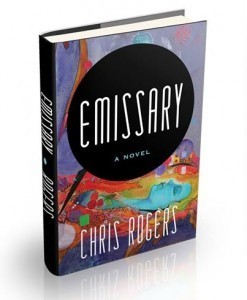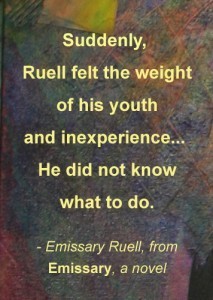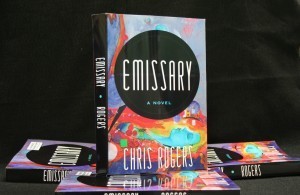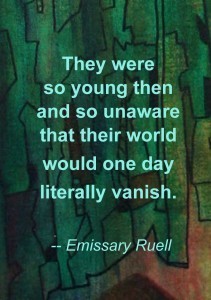Chris Rogers's Blog, page 23
November 6, 2014
18 Questions to Keep Your Story Going
What’s hidden?
What’s not as it seems?
What’s bigger than anyone knows?
Who started everything rolling then vanished?
Who wants more than a fair share?
Who’s keeping the big secret?
Where did these characters meet in the past?
Where is the stolen item?
Where can someone hide and not be detected?
How can the puzzle be finished?
How did this character lose faith in the cause?
How might the past help mend the present?
Which character cares most about what happens next?
Which location is most dangerous?
Which pair is the least compatible?
When did everything fall apart?
When will the hero face a crisis of the soul?
When did the nemesis wander off course?
Pre-Order Emissary at ChartHousePress.com/books-emissary/
November 4, 2014
Plot in a Nutshell
For my NaNoWrim-ing friends – thanks to the late Dwight Swain, I’ve broken down plot for you into simple but dramatic steps.
Setup:
Begin with an idea that hooks you. Ideas are everywhere.
Pinpoint the prize for which opposing characters are willing and ready to fight—murder, treasure, a missing child, honor …
Devise a central character who will take immediate aggressive action to win the prize.
As Alfred Hitchcock once said, decide what your hero will need to do, then give your hero the knowledge, skills, and abilities to make success plausible.
It’s good if the reader can like and approve of the hero. But don’t discount the lovable rascal, part hero, part villain. Feelings, not just greed or duty, should be the motivating force.
Pick a moment that will plunge the character into exciting action, then open the starting gate.
Complications:
Pit the hero against a worthy opponent. Remember: the hero’s strength equals the villain’s strength.
Outline the dangerous step-by-step action your character must take in the face of unanticipated developments to solve the murder, find the treasure, or rescue the missing child.
Payoff:
Work out a satisfactory conclusion in which the character your reader wants to win wins. A climax needs an unanticipated twist:
Someone thought to be dead is actually alive/or vice versa. The coins thought to be counterfeit are actually platinum. The child was not kidnapped but is hiding from the rescuer.
Be sure to plant elements that make the twist plausible. And make sure the winner deserves to win.
As in the infrastructure of a house, you must place the timbers correctly and solidly so the structure will hold. Once that structure is in place, you can add any sort of architectural embellishment, color, and decorative accents to flesh out your story. But only by previously envisioning the desired result will you know where to place the timbers.
Some writers struggle with plotting, while others get the plot down quickly and move on to the writing. Often the best plots can be scribbled on the back of an envelope. Try this “Nutshell” approach and see how it works for you.
Pre-Order my new novel, Emissary, at: http://charthousepress.com/Chris-Rogers/
November 2, 2014
A Quick 9-Question Novel Outline
Although I’m not an official NaNoWriMo “winner,” I’ve published a number of novels, and the rough draft of one of those, some 55,000 words, was completed in the 30 days of November. Every writer has his or her own methods, but I’ve found that spending 10-20 minutes to complete a quick outline makes the work go smoother.
This 9-Question working outline helps me stay focused. Perfection is not the goal. Getting the story roughly outlined is the goal: a simple reference to keep you focused as you write.
1. Who? Who is your hero, what does s/he want (story goal)? Whether you introduce the hero first or the story question first is entirely subjective and usually depends on the type of story you’re telling.
Show, briefly, the hero’s ordinary world, family, career, location—whatever is pertinent to the story. Include a character strength—belief, skill, knowledge, etc—that will carry the hero forward.
2. Why? Why does s/he care (heart vs. duty) and what are the stakes? Imagine a bridge between the hero’s static but natural world and the story world where chaos and conflict reign. What is important enough to make the hero enter that world?
Don’t confuse subplot goals or individual scene goals with the overall story goal. Your hero might have a crisis in progress when the story opens—a storm coming or the dishwasher has flooded the kitchen—but this is not what the story is about. Unless it’s pertinent to the ending, such detail is not included in your quick outline.
3. What? What immediate conflicts prevent the hero from grabbing the brass ring? Imagine the first time a carousel circles, the ring is out of reach. The hero stands on a horse for better reach, but just as he’s about to grab it, a carnival clown walks by and gets in the way. Still standing, the hero reaches for the ring again, but another carousel rider knocks her off the horse. Conflicts always must escalate in intensity. Quickly brainstorm major obstacles the hero will encounter.
Introduce the nemesis, the person who most stands in the way of your hero achieving the story goal.
4. What new information kills off former assumptions? At the midpoint, where a story might otherwise sag, give it an extra punch. Spin it in a new direction. Both Chris Vogler and Michael Haig suggest a “death in the middle,” though not necessarily the death of a person. It might be the death of innocence, death of an idea or an ideal, or death of the goal – only to be replaced by a second, closely related and more important goal. Remember, this is a “sketch,” hitting only the high points. Do not include blow-by-blow scene descriptions.
5. What new story question emerges? Show us what the hero is thinking and planning, based on the new situation presented at the midpoint—and remind us of the ticking clock.
6. What new conflicts arise? These are often questions to be answered or problems to be resolved. Use escalating action—make sure each story point is more exciting, more devastating, more insurmountable than the last.
7. What final devastating blow raises the stakes? This is the hero’s lowest moment, when all is lost and there seems no way out. Give more word space to the final obstacle, then describe the hero’s internal struggle with tackling this last—and most frightening—obstacle.
8. What decision triggers the climax? What burst of faith or energy or determination brings the hero back into the fight?
9. What is the final conflict, where does it happen, what is the outcome? Rarely can I answer this final question in detail until I’m deep into the writing, but it helps to have the question always out there ready to be answered as soon as you can clearly see it.
While the answers to these nine questions may not write your story for you, they will certainly help you tell it in the concise manner a rough draft requires. As a bonus, once your novel is finished, the same 9 questions will serve in writing a synopsis.
October 28, 2014
If ET Knocked On Your Door…
what would you do? Scream? Run? Invite him in?
It’s human nature to be attracted to our own kind and to be wary of any creature that’s distinctly different from us, an instinct that contributed to our survival as a species for thousands of years. We flinch from a scorpion or a tiger—not so much from a hairy ape because he appears somewhat like us.
What if the extraterrestrial at your door could cure a disease that you or someone close is struggling to survive? How would you feel then about inviting that creature into your home?
What if close association with this visitor could extend your life by hundreds of years? Could you arrest your fear long enough to become friends?
This certainly isn’t a new theme among science fiction stories, but it endures because there are so many angles it can take.
Emissary, a novel slated for December 2, 2014 release, takes a fresh view of it—among other engaging subplots. It’s ready now for
Pre-Order at ChartHousePress.com/books/emissary.
And if you recall a science fiction story from the late 50s-70s, in which a dog-size cockroach-like creature appears on Earth, and the person finding it instantly kills it before realizing that it’s both sentient and friendly, would you let me know the title. Trying to remember is driving me nuts.
October 25, 2014
A Real Slam-Bang Change of Pace
Mystery author Bill Crider is someone I’ve admired for many years. He not only is a talented writer, with more than 60 books and short stories to prove it, he also is a sterling individual. So having Bill Crider give my new novel, Emissary, a “thumbs up” review had me walking on air all day. Well, he posted it on Thursday, http://billcrider.blogspot.com/2014/10/emissary-chris-rogers.html, and I haven’t touched ground yet.
My favorite Crider series features Sheriff Dan Rhodes. When I need a lift, I can pick any Dan Rhodes mystery off my shelf and re-read it merely for the fun of visiting the characters of Blacklin County again. And Crider’s covers are always cool. 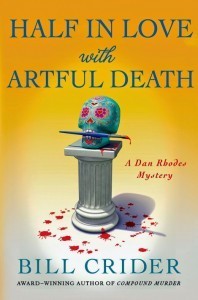
But some of Crider’s books have much darker stories, and even though I grew up reading dark fiction, he manages to raise a few hairs that haven’t been ruffled before. But wait, there’s more … he writes YA fiction that adults can enjoy, westerns, spy novels, horror, and he contributes a column regularly, “Blog Bytes,” to Ellery Queen Mystery Magazine.
While I cannot imagine anyone who doesn’t know Crider’s work, I suppose there could be one or two individuals on the planet who hasn’t had the pleasure. If you’re one of those, you’ll want to remedy that situation immediately. Since 1986, Bill Crider has been a fan and an author with plenty to say. Trust me, he’ll make you smile, and even better, he’ll make you think.
Emissary, my cross-genre thriller, is available now for
Pre-Order at ChartHousePress.com/books/emissary
October 18, 2014
In Time for Halloween
A pocketful of eerie stories to treat your October reading appetite. In this 3rd annual anthology, you’ll find mystery and dark humor in small towns. You’ll find a devious surprise in a clown act, payback in a school principal’s office, and romance on an off-planet ecofarm. As a bonus, you’ll catch the opening chapters of Emissary.
A woman new to country life learns that dead things are as natural as living. — Deer Corn
A man murders his neighbor over a pair of prize-winning hogs, and an eager special prosecutor considers the case a slam dunk. But is it? — Nailed
When super-acute hearing makes even the faintest sounds of human existence utterly unbearable, where do you go to escape? — Sounds of Silence
Some injuries have a way of toughening up a person and teaching now not to be injured again. Ever. — Texas Dewberries Don’t Come Easy
A burglary ring outwits the police and successfully evades capture, until they cross paths with the Gray Fox Patrol. — Clowning Around
A master who passes on his skill and knowledge to the next generation is a laudable mentor. Would a serial killer be the exception?– Blades of Starlight Glen
Bullies come in all sizes, and blood-curdling vicious beats “big” any day of the week. — Hammer
Bonus: Read the opening chapters of Emissary, Chris Rogers’ long awaited cross-genre thriller.
Order today online Death Edge 3: 7 Teeth-Chattering Stories of Suspense in paperback or e-book.
http://www.amazon.com/Death-Edge-Teeth-Chattering-Stories-Suspense 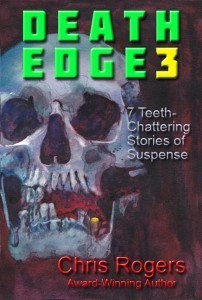
October 16, 2014
A Bottle of Time
Past or present, which would you save? Leave it to writers and dreamers to make us think of the impossible – which, with continuing frequency, becomes only improbable then… who knows?
When you’re five, you wish you were older, big enough to ride a real bike, maybe. Then you wish you were old enough for a motor bike, then a car.
Or … what if you were old enough to have your own apartment, nobody telling you what to do? Old enough to be out of college and have a real job? Then … if only son-and-so would quit or retire and you could move into that office.
At what point would you freeze time, if you could? Legally, age 18 marks you as a grownup with childhood behind and a whole life ahead. You’re suddenly responsible for your own lunch money. Is that the place?
When I was 18, I wanted to be 29, so that’s what I told people for the next 11 years. Amazingly, they believed me. The year I actually turned 29, life did a big bang. It was as if my world vanished and was replaced by another.
Astrologers, as well as some psychologists, propose that each of us passes though a gate between the ages of 28 and 32. Within that gate, we make a major life decision that takes us in a new direction. If we’ve never married, it may happen then. If we are married, we may divorce during those years. No children? This might be when you decide to have your first. Still studying for your career? You might finally launch it?
Time doesn’t stop when you’re having fun. It doesn’t stop when you’re mired in misery.
If, like the songwriter Jim Croce, you could save time in a bottle, would it be today?
What could you do to make this a day you never want to forget?
Emissary, a cross-genre thriller featuring Emissary Ruell is available now for
Pre-Order at ChartHousePress.com/books/emissary
October 14, 2014
When Does Your Confidence Need a Boost?
For me it’s about once a day. Even on familiar projects, I’ll start second-guessing myself. At those times, having good resources — including friends — to draw on is a definite plus. Additionally, here are 3 things I do to shake the chill off my cold feet and reboot my self-assurance:
1. Put on music that lifts my mood, different sounds for different tasks. Writing requires about 50-60 beats per minute, painting more like 70-80.
2. Stand up, loosen up, breathe. Oxygen increases alertness and energy while reducing stress. It requires no shopping or preparation, and it’s FREE. Yet so often when I experience lack of confidence I realize I’m practically holding my breath. So breathe!
3. Remind myself of something in the past that I did quite well. At home, I keep tokens of various successes in sight or at least in easy reach. Spending a minute or two gazing at and maybe holding an award or a memento, recalling the achievement, then relating that success to what I’m doing now will usually put me back on track. When away from home, I goose the old memory cells. Closing my eyes for a couple of minutes, I visualize a successful event or accomplishment – complete with the sound of voices congratulating me, tastes, smells, textures and whatever good feelings I can conjure. This works. Try it.
And all of this take less than 5 minutes.
What are some ways you gear up for tackling a big, scary job?
Officer Kirk Longshadow is a focal character in my cross-genre thriller, Emissary. Pre-Order it today at ChartHousePress.com/books/emissary.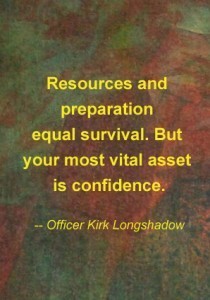
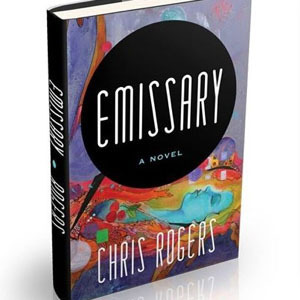
October 13, 2014
Our Many Faces
Think about it. You wake up barefaced, fuzzy-headed, not much caring how you look. If you live alone, that might be it for the day. Brush your teeth, run a comb through your hair and you’re done.
But let’s say you have a spouse. You put on your “Good morning” face. If you have kids, they get a slightly different version, depending on how much noise they’re making.
A work day requires smiling at the right people. If you work alone, maybe you grab a coffee, beeline to your cubbyhole, close the door, and relax.
If you’re in sales, ahhh, that’s a different color horse you’ll be riding, and each stop you make or each person who walks in the door requires a slightly different face. New customers get the big smiley, faithful customers get a more genuine grin that says without asking, “Howdy, how are you?”
Lunch with the boss requires: serious but not gloomy, alert but not nervous, content but not complacent, while hoping your acid reflux doesn’t act up. A night out with friends means wearing big smiley again, but once the “Howdies” are over, it’s okay to unbend a little, just don’t look bored.
Living alone and in the country, I sometimes have to practice in the mirror so my face will know how to act when I take it out in public. Then before making that long drive to the city, I plan my day with back-to-back encounters. This trip, for example, I’ll be having coffee with my editor, striving to look like the hardworking author I am, visiting a bookstore to drop off an Advance Reader Copy of Emissary and looking like the bestselling author I hope to be, then to a grocery store, car wash, and dinner with good friends I haven’t seen in a while.
My face will get a quite workout.
What face are you wearing today?
Emissary, a cross-genre thriller – Pre-Order NOW at charthousepress.com/books/emissary
Separations and Beginnings
Separation is akin to loss. We ache for the people we lose. We mourn the things we lose, and the more those people or those things mean to use, the deeper our suffering. Fictional characters are no different – at least, those who become most real to us are no different. In fact, the more we can identify with specific characters, the more real they become, and the more time we want to spend with them.
One way of making characters real, then, is to give them something to love then take it away. Make them ache, mourn, hurt because of the separation. The loss.
The basis of all our fears, some psychologists believe, is fear of loss.
Loss of life is instinctive. And the longer we live, it seems, the more we cling to the years we have left.
Loss of a loved one is possibly the most difficult to endure.
Loss of security can be scary, whether physical, emotional, or financial.
Loss of love may seem like the stuff of romance novels, but face it, we all need to love and be loved. To touch and be touched. It’s a human necessity. That’s why lonely old ladies have cats.
After separation comes a new beginning. We lose a home, we start over … eventually. We lose a love, we mourn … then somehow we start over.
In writing Emissary, I was intentionally cruel to my two main characters. I took away everything. That loss is their only common ground, in every other way they’re opposites.
Then I plunged them into a situation where the only salvation is to find each other. In finding each other comes a new beginning, but they have to work for it.
Emissary is a cross-genre thriller about separations and beginnings.
Pre-Order the book now at charthousepress.com/books/emissary


